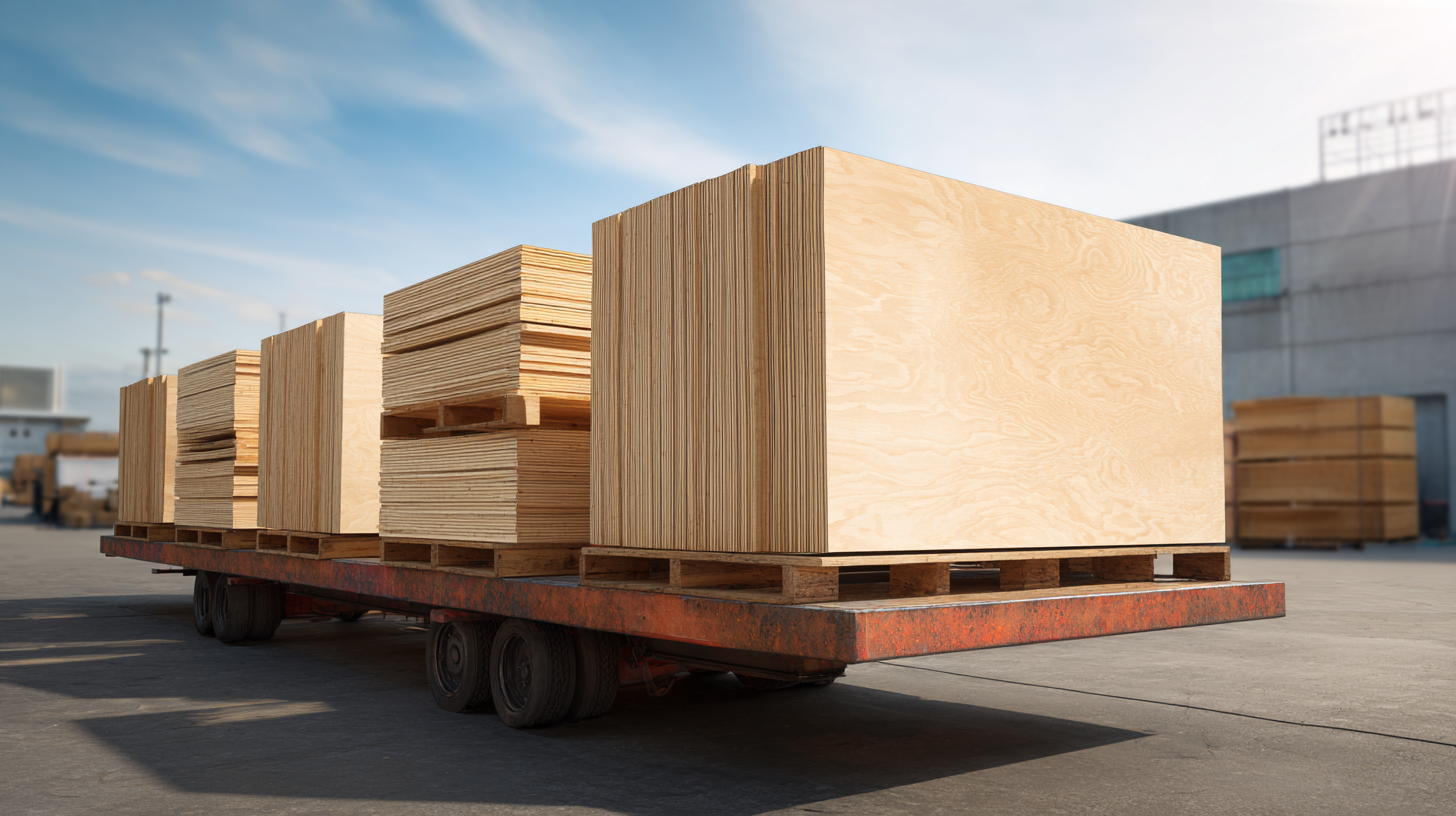In the ever-evolving construction and woodworking industry, efficient plywood delivery has become more crucial than ever. According to a report by IBISWorld, the plywood manufacturing industry is projected to reach $23 billion in revenue by 2024, reflecting a growing demand for quality materials. With rapid advancements in logistics and supply chain management, businesses that offer seamless plywood delivery are capitalizing on this trend. A study from Grand View Research highlighted that the global plywood market is expected to witness a CAGR of 6.8% from 2021 to 2028, indicative of increasing construction activities worldwide. As builders and manufacturers seek to optimize their operations, timely and reliable plywood delivery services are essential to ensure that quality supplies are readily available, thus supporting project timelines and enhancing overall productivity.

Timely plywood delivery is critical for the success of construction projects, impacting both the efficiency of operations and cost management. According to a report by the National Association of Home Builders, delays in material delivery can extend project timelines by an average of 20%, significantly increasing labor costs and potentially leading to penalties. Ensuring that quality supplies are delivered right when needed eliminates bottlenecks and allows contractors to maintain their schedules.
Furthermore, the demand for plywood has surged in recent years, with the market expected to grow by over 6% annually, driven by residential and commercial construction. A study by Allied Market Research indicates that timely delivery has become a top priority for builders aiming to leverage this growth. Reliable suppliers who offer efficient logistics not only enhance project timelines but also foster better relationships with contractors, ultimately contributing to successful project outcomes.
Efficient plywood delivery is thus not just a service; it is a vital component that supports the entire construction ecosystem.
The efficiency and reliability of plywood delivery are influenced by several key factors that play a crucial role in meeting customer needs. One of the primary elements is the logistics management system employed by the supplier. A robust logistics framework ensures that the supply chain operates smoothly, enabling timely order processing and minimizing delays. This involves precise inventory management, where suppliers must keep track of stock levels to anticipate demand and make necessary adjustments. Utilizing technology, such as tracking software and automated alerts, can significantly enhance the coordination between suppliers and customers.

Another significant factor is the geographic location of the supplier in relation to the customer. Proximity can dramatically affect delivery times; suppliers closer to their customers can promise quicker turnaround times and lower shipping costs. Additionally, the choice of transportation methods enhances delivery efficiency. Suppliers that utilize a variety of transport options—be it trucks, rail, or even air freight—facilitate faster response times and provide flexibility in handling different project sizes and requirements. Lastly, building strong relationships with trusted carriers can also ensure consistent delivery services, allowing suppliers to maintain their commitments to customers.
The implementation of technology in plywood supply chain management has transformed the way suppliers and customers interact, making the entire process more efficient. Advanced software systems enable real-time tracking of inventory levels, allowing companies to respond quickly to customer demands. This immediacy not only helps maintain optimal stock levels but also reduces the risk of overproduction and waste.
Automated ordering systems can predict future supply needs based on historical data and current trends, ensuring that quality plywood is always available when required.
Furthermore, technology facilitates better communication between all parties involved in the supply chain. With collaborative platforms, suppliers, manufacturers, and retailers can share information seamlessly, reducing delays and misunderstandings. Enhanced data analytics tools provide insights into market dynamics, enabling stakeholders to make informed decisions.
This level of connectivity and insight not only streamlines operations but also enhances customer satisfaction by delivering quality supplies on time. As the plywood industry continues to embrace these technological advancements, we can expect even greater efficiency and responsiveness in meeting the needs of a demanding market.
The plywood market is poised for significant growth, projected to reach USD 60.31 billion by 2030. This expanding market is driven primarily by increasing demand across key sectors such as construction and furniture manufacturing. According to the IMARC Group, North America alone is expected to see its plywood market size increase to 20.35 million cubic meters by 2033, with a compound annual growth rate (CAGR) of 2.69% from 2025 to 2033. Meanwhile, the Philippines plywood market is projected to reach USD 1,493.33 million by 2033, showcasing a robust CAGR of 4.51%.

Understanding the dynamics of demand and supply within this industry is essential for businesses aiming to navigate the complexities of the market. With fluctuating lumber prices and influential factors such as tariffs affecting trade, companies must stay informed and adaptable.
Tips:
When choosing a reliable plywood supplier, it’s essential to consider several best practices to ensure that your project runs smoothly. A reputable supplier should offer high-quality materials that meet industry standards. According to a recent laminated plywood manufacturing plant report, successful suppliers often have detailed insights on project economics, including capital investments and operating expenses. This knowledge can greatly influence your selection process, as it ensures you are working with a supplier that understands the financial and logistical aspects of plywood delivery.
Tips for selecting a reliable supplier include evaluating their product range and quality certifications. Look for suppliers who can demonstrate their commitment to sustainability and quality management. For instance, some suppliers might provide laminated plywood that adheres to environmental regulations, which not only benefits the planet but also enhances the durability of your projects. Additionally, checking customer reviews and testimonials can provide valuable insights into the supplier’s reliability and service quality.
Another critical practice is to verify the supplier's delivery capabilities, ensuring they can meet your timelines effectively. You may notice that top suppliers often emphasize their ability to provide effortless delivery services, which is crucial when you need quality supplies right when you need them. Being informed about various types of plywood and understanding associated costs can further empower you to make the best choice for your specific needs.







Signup our newsletter to get update information, promotion or insight.